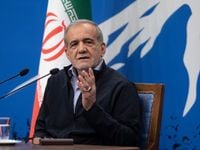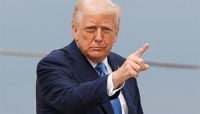On March 31, 2025, Iran escalated its diplomatic tensions with the United States by sending a formal protest note to Switzerland, which manages American diplomatic interests in Tehran. This action came in response to President Donald Trump's recent threats to target Iranian territory and impose additional sanctions if Iran does not reach an agreement on its nuclear program.
According to Iranian state television, the Swiss embassy's representative in Tehran was summoned to the Iranian foreign ministry due to ongoing "Israeli aggression" in Gaza and Trump's aggressive rhetoric. The protest note included a stern warning to the United States against any "hostile actions" towards Iran.
Tehran's message was clear: the Iranian government stated that it would respond "firmly and forcefully" to any potential attacks from the United States. The Swiss diplomat indicated that he would relay this serious warning to Washington immediately.
On the previous day, Iranian Supreme Leader Ali Khamenei had vowed a strong response to threats from both the United States and Israel. During his Eid al-Fitr sermon in Tehran, he stated, "Washington and the Zionist entity threaten Iran, but they will receive a strong response." Khamenei accused Israel of committing grave atrocities in Gaza, claiming that the actions taken against civilians were tantamount to genocide, with over 20,000 children reportedly affected.
In a further demonstration of Iran's defiance, Foreign Minister Abbas Araghchi remarked, "We will not succumb to threats and will not allow anyone to address us in the language of force. Our enemies will regret their threats." He emphasized that the notion that an attack on Yemen could serve as a pretext for an assault on Iran was not new, asserting that Iran would never yield to such intimidation.
The Iranian military's political office echoed this sentiment, stating that the threats from the U.S. aimed to coerce Tehran into negotiations and yield "illegal concessions." They insisted that negotiations under sanctions and threats would not achieve U.S. objectives.
On March 30, Trump had explicitly threatened to impose further sanctions on Iran if it failed to negotiate regarding its nuclear ambitions. He indicated that Washington's decision on additional tariffs would depend on whether a deal could be reached.
In the backdrop of these escalating tensions, Iranian President Massoud Bazshkian confirmed that Iran had rejected direct negotiations with the United States in response to a message from Trump concerning the nuclear program. Reports indicated that on March 12, the UAE delivered a message from Trump to Khamenei, to which Tehran responded through Oman.
In an interview with Fox Business earlier in March, Trump stated, "I hope they negotiate because I don't want to militarily enter because it would be terrible," reflecting his administration's ongoing struggle to manage relations with Tehran.
The situation remains precarious as both sides continue to exchange threats and warnings, with the potential for further escalation looming. The Iranian leadership has made it clear that any military aggression will be met with a robust response, while the U.S. administration appears determined to maintain pressure through sanctions and diplomatic maneuvering.
As the world watches closely, the implications of these developments could have significant repercussions not only for U.S.-Iran relations but also for stability in the broader Middle East region.





